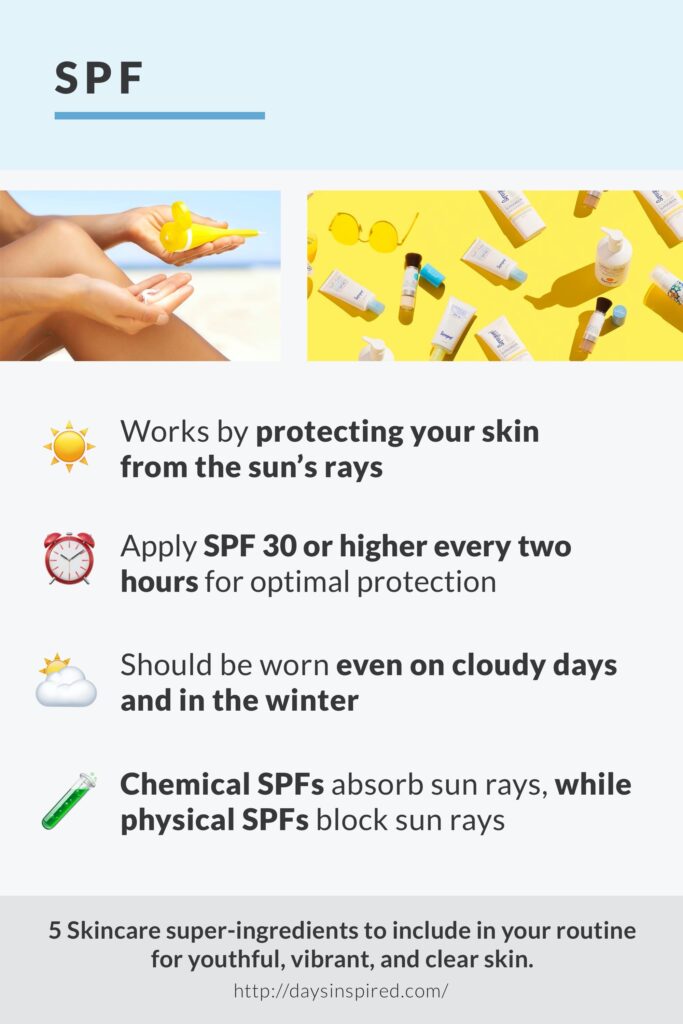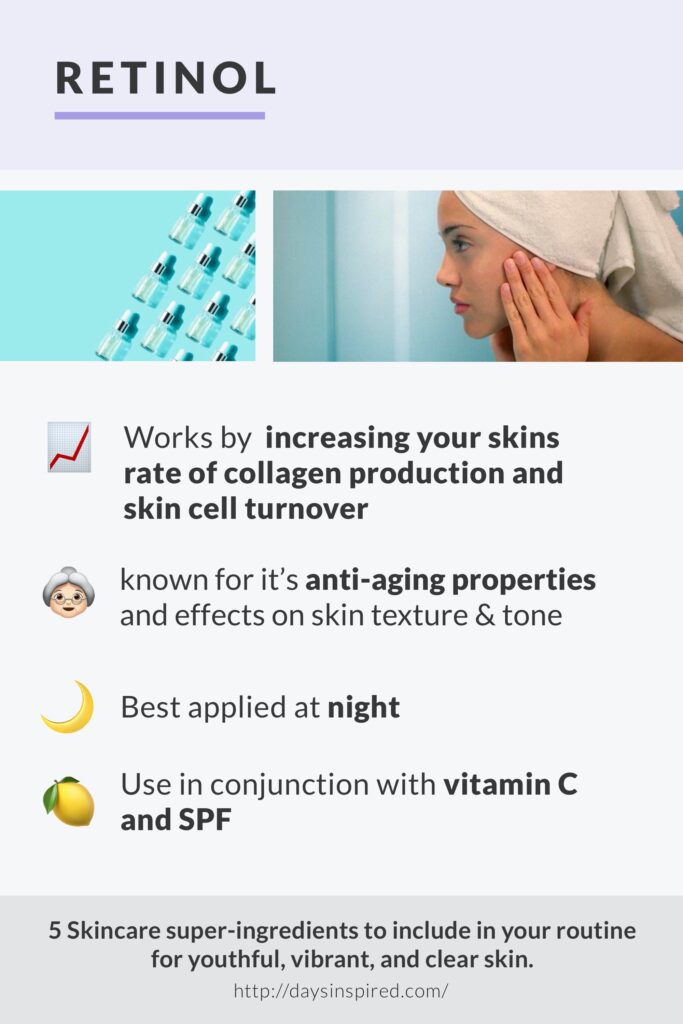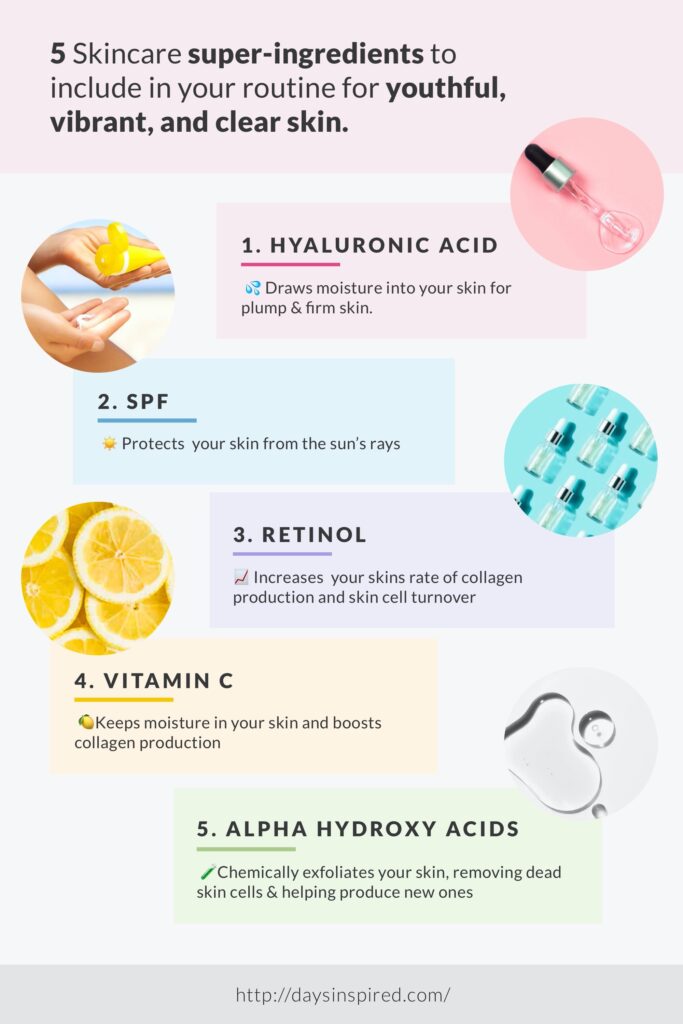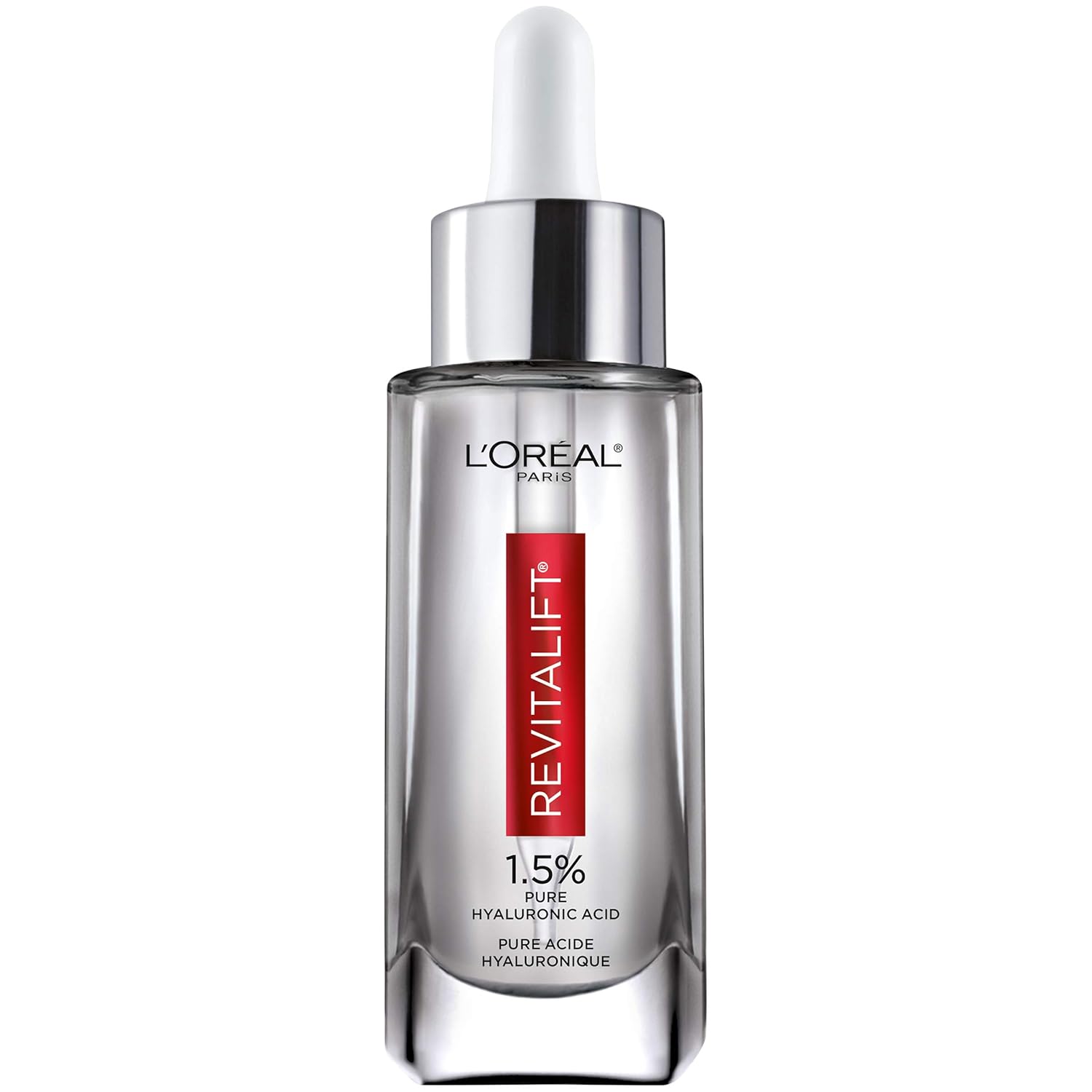Skincare can be so overwhelming these days. It seems like everybody has a 52 step routine using products with ingredients you can’t even pronounce.
It definitely does not have to be so crazy. I wanted to showcase 5 super powerful ingredients to look out for, that will ensure your skincare routine is doing what it should– keeping your skin bright, smooth, clear, and youthful!
If your skincare routine only included 5 things, these ingredients are a great place to start. Because hey, some of us just can’t keep up with all the new products and trends.
Here are 5 skincare ingredients that will go a long way, and where you can find them.
SPF

If you haven’t heard by now, you should definitely use SPF in your skincare routine. SPF stands for Sun Protection Factor, and you don’t just need it when you’re out in the sun for extended periods of time. Sun damage adds up over time, so SPF is critical for everyone.
Why it’s Important
The sun’s rays, called UVA and UVB rays, damage our skin when exposed. What kind of damage are we talking about? These rays cause premature aging, wrinkles and sun spots. Not only do they cause cosmetic issues like these, but they can lead to skin cancer. With an estimated 1 in 5 Americans developing skin cancer, we should all be doing our best to protect our skin.
What to look for
One awesome thing about SPF is that it can be found in a variety of skin products including tinted moisturizer and foundation. There are 2 types of SPF found in skincare products:
- Chemical SPF: Chemical SPF is likely what you’ve use in the past. It’s what most sunscreens are made of, and it works by absorbing the sun’s rays. On an ingredient label, you’ll look for things like: Oxybenzone, Avobenzone, Octisalate, Octocrylene, Homosalate, or Octinoxate. While this type of sunscreen is much easier to apply and rub into your skin due to its thinner formulation, there has been some concern about the safety of the ingredients. It’s a good idea to do your own research on this to make the best decision for you personally.
- Physical SPF: Physical SPF works by creating a physical barrier to the suns rays. They block the full spectrum of rays, whereas chemical sunscreens only block some of the rays. While it can be a bit heavy, this Is a great option for sensitive skin. You’ll want to look for products that include Zinc Oxide or Titanium Dioxide.
For daily use, look for products that are SPF 30 or higher. This will make sure your skin is optimally protected.
When to apply it
You should apply sunscreen every morning, all year round. That’s right. The sun is still powerful during the winter time, and even when it’s cloudy outside. It’s a common misconception that you only need to wear SPF on days where the sun is intense or you are spending a great deal of time outside. On these days, you may want to use products with a higher SPF, but it’s still a good idea to wear sunscreen on other days too.
It’s also recommended to reapply sunscreen every two hours to ensure protection throughout the day. I know, it’s a lot of work! We’re all just doing the best we can.
My favorite products with SPF
- CoTz Face Prime & Protect Tinted SPF 40
- Daily Sunscreen +: Invisible Shield | Glossier
- Raw Elements TINTED FACE MOISTURIZER SPF 30 *PLASTIC FREE*
Retinol

Retinol is an excellent reparative ingredient to include in your skincare routine. It works to keep your skin clear and youthful.
Why it’s Important
Retinol is a miracle worker in terms of its anti-aging properties. Even if you’re young, it’s a good idea to start looking out for the longevity of your skin. It works by increasing your skins rate of collagen production and skin cell turnover.
Due to it’s regenerating properties, over time, you’ll be left with improved skin texture, less fine lines, and a more even skin tone.
Another benefit of retinol is that it can help treat acne and clogs pores without harsh exfoliation. It really is a win-win!
What to look for
You should look for retinol and retinol palmate in your skincare. Of the two, retinol is a bit stronger. Either way, if you have sensitive skin, it’s recommended to test on a small patch of skin before fully committing. They can be found in so many different types of skincare, such as night creams, gels, and serums.
When you’re looking for a retinol product, you should also look for something with Vitamin C as the two work synergistically.
When to apply it
Retinol is best applied at night. It’s known for being a bit harsh on skin when you first start using it, so I’d recommend easing into your retinol routine. Start using retinol one night a week and gradually increase usage to about every other night.
Because retinol makes your skin more sensitive to the sun, you should always wear SPF in conjunction with retinol. Although, if you’ve been paying attention, you should be doing that anyway 😉
My favorite products with retinol
Vitamin C

Vitamin C has SO many benefits for your skin, it’s hard to capture them all at once. We get vitamin C in our diets through things like citrus fruits, and it’s super healthy for a number of reasons. Applied topically, it’s benefit to our skin is maximized.
Why it’s Important
Vitamin C in skincare has 3 main benefits:
- Hydration: After applying moisturizer, your skin loses that hydration over time. Vitamin C prevents this from happening by reducing transepidermal water loss, allowing your skin to better retain moisture
- Even skin tone: Vitamin c can help you achieve a healthy, even, glow and treats a number of skin discoloration issues including: reducing redness, fading hyperpigmentation, fading age spots, and reducing under eye circles
- Plump & firm skin: vitamin C boosts collagen production, which helps prevent your skin from developing wrinkles and sagging over time
What to look for
Vitamin C shows up on ingredient labels as L-ascorbic acid, ascorbyl palmitate, or magnesium ascorbyl phosphate.
In order to get the most out of your vitamin C skincare product, you should also check to see that the formula is water-free, and that the container it is in is opaque and airtight. Otherwise, your vitamin C may lose its potency while on the shelf.
When to apply it
Like any other skin care product, first test your skins reaction. Then, you can apply vitamin C to your skin once to twice per day.
Because Vitamin C helps prevent sun damage, it’s a good idea to apply in the morning.
Apply vitamin C directly after toning your skin, but before moisturizing.
My favorite products with Vitamin C
- The Ordinary Vitamin C Suspension 30% in Silicone
- Valjean Labs Facial Serum, Glow
- TruSkin Vitamin C Serum
Hyaluronic Acid (HLA)

Hyaluronic acid is actually a substance that naturally occurs in our bodies— specifically in our joints, eyes, and skin. It plays a key role in moisture, which is why you’ve probably seen it included in a lot of skin care products recently.
Why it’s Important
When applied topically, hyaluronic acid acts a a humectant. Meaning, it pulls water from your surroundings into your skin. Hyaluronic acid is a super powerful humectant, absorbing up to 1,000 times its weight in water.
So why is moisture so important for skincare? Not only does it instantly act to give your skin that glowy, smooth effect, but over time, it can reduce the appearance of fine lines and wrinkles.
What to look for
Getting a skincare product with at least 1% hyaluronic acid will produce the best benefits. Many products even have 2%.
With hyaluronic acid, it’s important to note that if you are vegan, you’ll want to look for vegan sourced hyaluronic acid. Not all hyaluronic acid ingredients are vegan due to it being found in animal tissue.
When to apply it
You can apply hyaluronic acid in the morning, evening, or both! The most important thing to be mindful of when using HA is that it is most effective when combined with a cream or oil. This is the case especially if you have dry skin. The reason is that hyaluronic acid works by bringing moisture from your surroundings into your skin. So, when you wear a moisturizing cream on top of HA, it allows the HA to work its magic and last a long time.
My Favorite products with HA
- Loreal Hyaluronic Acid Serum
- Asterwood Naturals Hyaluronic Acid Serum
- The Ordinary Hyaluronic Acid 2% + B5
Alpha Hydroxy Acids (AHAs)

Alpha hydroxy acids are an extremely powerful, albeit somewhat intense skincare ingredient. They can be found in things like serums and masks, but are also the main ingredient in more intense treatments like chemical peels. While they have a long list of benefits, primarily, they work their magic through exfoliation.
Why it’s Important
Simply put, AHAs give you a fresh layer of skin. They are a chemical exfoliant, which helps you shed dead skin cells and regenerate new ones. Believe it or not, not handling these dead skin cells leads to a number of problems including acne, discoloration, and wrinkles.
By exfoliating your skin and getting rid of these dead skin cells, they help brighten your skin, prevent acne, correct discoloration, and prevent wrinkles and fine lines by encouraging collagen production.
What to look for
There are a lot of different kinds of AHAs that are derived from both plants and animals. However, the most effective types are glycolic acid, which is derived from sugar cane, and lactic acid, which is derived from lactose. These are also the two least likely to cause skin irritation, so if you have sensitive skin, you’ll especially want to be on the lookout.
When to apply it
First and foremost, it’s important to note that AHAs can cause irritation, itching, and burning. So take it slow with the AHAs, and don’t try something super concentrated at first.
AHAs can be applied daily as part of products like moisturizers and serums. If you are using AHAs this way, look for a lower concentration— around 3-5%.
The other option is to use more concentratedAHAs less frequently in something like a face mask or treatment. I personally do an AHA mask once a week.
Best products with AHAs
- The Ordinary AHA 30% + BHA 2% Peeling Solution
- Prism 12% AHA + 3% BHA Exfoliating Glow Serum
- Paula’s Choice SKIN PERFECTING 8% AHA Gel Exfoliant
With the quantity of skincare products on the market, it’s important for us as consumers to take a look at the ingredients and make sure they’re actually going to provide our skin benefits. I hope this list gives you a place to start next time you’re looking for a new skincare product to try.
Cheat Sheets
Everything we talked about in this post in a pin-able & shareable format!



















